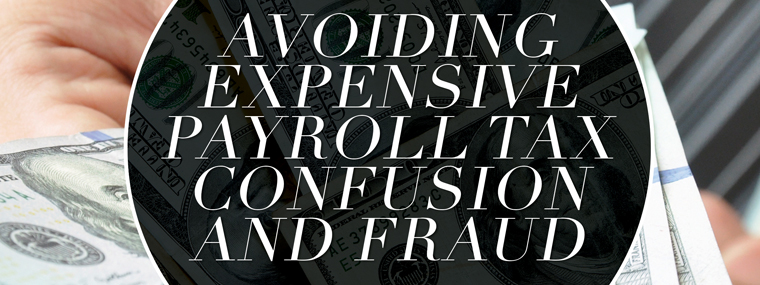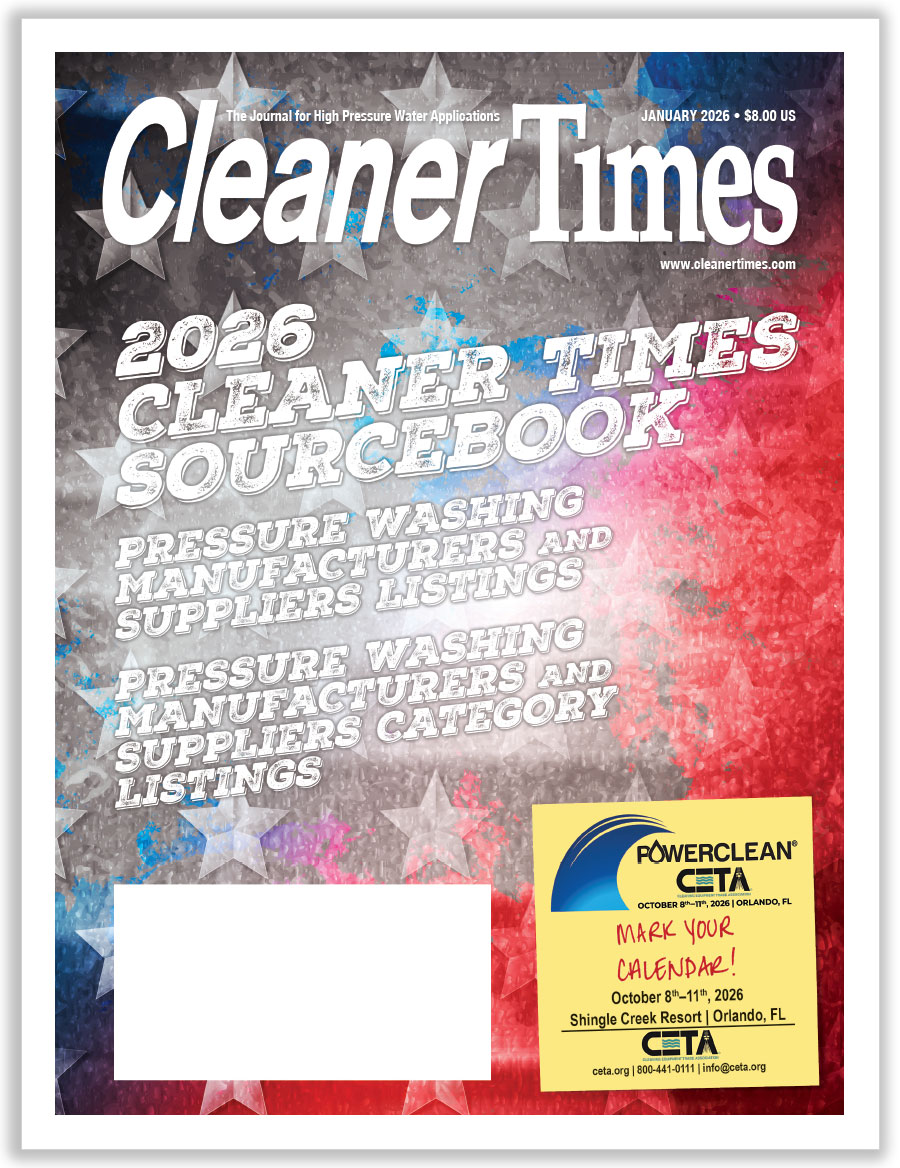
Financial: Avoiding Expensive Payroll Tax Confusion and Fraud
By Mark E. Battersby / Published September 2015

The IRS is often viewed as being tough when it comes to collecting in-come taxes, but, as many pressure cleaning contractors and business operators can attest, they are even tougher where payroll taxes are concerned. Many owners and business managers get in trouble because they don’t understand the complexity of our payroll tax laws.
Payroll tax complexity may be why almost 40 percent of small businesses use a third-party payroll service for tasks ranging from paying employees to administering Federal employment taxes. Unfortunately, while outsourcing the pressure washing operation’s payroll process to an outside company or bank may help with on-time returns, employment tax withholding and forwarding, and even the payroll itself, it is still the employer who remains liable in the eyes of the IRS.
Confusion Among The Rules
Every business with employees is required to withhold payroll taxes from paychecks and to pay all applicable federal, state, and local taxes. The taxes usually withheld from employee paychecks include FICA (Medicare and Social Security taxes) and federal, state, and local income taxes, if applicable. Other withholding obligations include FUTA (Federal Unemployment Tax Act) payments and, in several states, disability insurance taxes.
Failure to pay these taxes or missing a payment may result in heavy fines and penalties, making it extremely important for every employer to calculate the amount of payroll taxes owed—and to pay them on time. On the flipside, many legitimate, money-saving strategies for manipulating employee pay are often overlooked as a result of not fully understanding the rules.
Responsibility Penalties
While the IRS is attempting to collect withheld payroll taxes from a pressure cleaning business that failed to forward or pay as required, they can and do go after all so-called “responsible persons.” In fact, the IRS can levy a “Trust Fund Recovery Assessment” against every responsible person—even someone with no knowledge the IRS wasn’t paid.
To the IRS, responsible person means not only the operation’s bookkeeper or its accountant, but the owner, officers, directors, and, in fact, anyone who makes decisions about who to pay or has check signing authority. What’s more, the rules allow the penalty to be assessed against multiple, “responsible persons,” allowing the IRS to pursue everyone they label as a responsible person.
Payroll Tax Services
When it comes to getting a pressure washing operation’s employees paid, it’s not just about keeping track of hours worked and cutting a few checks. Anyone not well versed in accounting or payroll processing might become downright overwhelmed and may turn to an outside payroll service. Not too surprisingly, the first question that needs an answer is whether there is a real need for the added payroll expense?
An employer that decides to hire a third-party vendor can only hope the vendor understands how to fill out the forms necessary to the reporting of income and employment taxes; comply with the Patient Protection and Affordable Care Act reporting obligations; and to properly calculate and timely pay over to the IRS withheld employee income tax and the employer and employee’s respective share of employment taxes. Most employers believe that if they pay income taxes and employment taxes into a vendor’s account, or give a vendor authorization to withdraw income taxes and employment taxes from the employer’s accounts, that the income and employment taxes will be paid over to the United States Treasury.
Unfortunately, there are all too many situations where actual vendor performance does not meet employer expectations. Worse, there are many times when an employer discovers that money set aside from employee income tax withholdings, and the employer and employee share of payroll taxes, does not get paid over to the Treasury. Even worse, many employers are often shocked to discover that they, the employer, not the payroll service company, are liable for all unpaid income and employment taxes—even though the taxes were paid to the vendor or removed from the employer’s accounts by the vendor.
Blaming The IRS
Each tax season stories about tax evasion convictions and indictments send a scare into taxpayers, usually just as it comes time to file the annual tax returns. This year the stories were eclipsed by an uptick in identity theft tax fraud. However, a new report from the Treasury Inspector General warns of another big problem: payroll tax fraud.
When the Treasury Department’s Inspector General recently looked at the IRS’s handling of payroll taxes, the IRS was faulted for not cross-checking and verifying payroll services and the companies for which they act. And catching those errors quickly is another big problem. Because of the snowballing nature of payroll tax liabilities, it is important for the IRS to detect and respond immediately when payroll tax defaults occur.
As the Inspector General noted, third-party payer arrangements usually work as intended, although there have been instances in which third-party payers receive funds from employers for payment of payroll taxes, but fail to remit those taxes to the IRS. This can cause significant problems for employers because while the funds have been expended, the taxes are still due. Are the IRS’s controls adequate to protect the taxpayer’s and Govern-ment’s interests when third-party payroll providers are not compliant with payment and filing requirements?
According to the report, processes still have not been established to link employers with all third-party payers. Of the four most common types of third-party payer arrangements, only a few so-called “Reporting Agents” are required to submit an authorization form that discloses the relationship between an employer and the third-party payer. The IRS does not require a similar authorization for employers that use the bulk of payroll services. The inability of the IRS to identify employers that use payroll services is a concern also raised in earlier studies.
Adding to the IRS’s problem, authorization forms are not always accurately processed. The Inspector General’s review of 85 agent authorization forms processed in Calendar Year 2013 identified 11 forms with errors. Because of these errors, authorizations provided by employers to their Reporting Agents were incorrectly reflected in IRS systems.
Confusion Alleviated
Given all of the complexities, it’s easy to understand why so many pressure cleaning contractors and businesses are paying the price for missed filing dates, tax payment failures, and other payroll tax mishaps. For many, there’s a solution: outsource to a payroll service or hire an accountant. Working with a payroll partner enables the business’s owner or manager to focus on other parts of the business and also helps keep the operation compliant—without having to sacrifice any management decisions or responsibilities such as hiring, firing, and compensation.
It is always a good idea to check to see whether payroll services are offered by the pressure washing operation’s bank. Often, banks consider payroll processing a courtesy, which means the price will likely be substantially lower than other payroll processing companies will charge.
And, for those worried about the cost of working with a payroll partner, consider a 2014 Small Business Taxa-tion Survey published by The National Small Business Association (NSBA), showing that some small business operators spend the equivalent of three weeks a year dealing with payroll taxes. Eleven percent of those surveyed spend more than 10 hours every month working on payroll taxes, while 43 percent spend between three and ten hours a month.
According to the survey, these taxes come with a heavy price tag as well, with more than a quarter of businesses spending more than $10,000 each year on simply the administration of federal taxes. This does not include the actual tax burden, which 42 percent of respondents said creates the largest burden on their business.
Payroll tax penalties can be devastating, but they can be avoided by making sure that all employment taxes are collected, accounted for, and paid to the IRS when required and by whoever required. One of the nastiest and most feared taxes currently imposed is the “Trust Fund Penalty Tax,” a whopping 100 percent penalty on payroll taxes withheld from a pressure cleaning business’s employees, but not forwarded to the Federal government.
Where an employer fails to properly pay over payroll taxes, the IRS can collect a penalty equal to 100 percent of the unpaid taxes from a “responsible person,” i.e., a person who: (1) is responsible for collecting, accounting for, and paying over payroll taxes; and (2) willfully fails to perform this responsibility.
Although a person must be both “responsible” and “willful” to be liable for any failure to collect or pay over trust fund taxes to the government, the burden of proof of innocence falls on the shoulders of the individual. And, it is up to anyone targeted to prove, by a preponderance of the evidence, that they are not a responsible person.
Understanding the basic rules for withholding payroll taxes—and paying over withheld amounts—on the wages of all employees in the pressure cleaning business is a good start. Checking the actions contracted for with a payroll service is also important. Overall, however, guidance and advice from a competent, qualified advisor is virtually a necessity.




